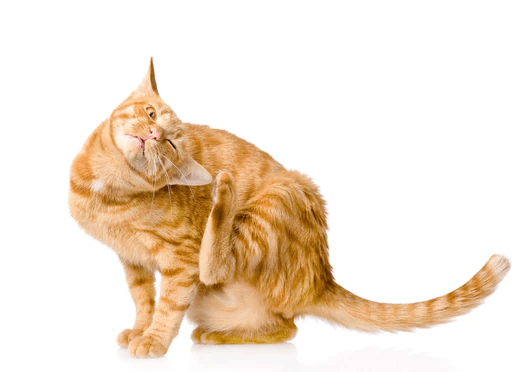August 30, 2022 |7 min read
5 Top Health Issues Caused By Fleas

Written by

Cat Litter That Prioritizes Their
Health & Your Happiness.
to get your first bag for only $14.99
Fleas can cause several complications for your feline friend. Keep reading to learn the answer to 'Can fleas make a cat sick?' and how to prevent fleas.
When I first moved to town, I lived with a dear friend and her sweet feline baby boy, a curious little Russian Blue named Bear. We lived in a cozy two-bedroom apartment near the beach, just the three of us– or so I thought. After some time of living together, I noticed signs that we might not be as alone as we had originally thought. It seemed as though my furry little roommate was showing signs that something was amiss. He kept scratching behind his ears with fury and determination. Something pesky and nefarious lurked beyond his fur, a teeny, tiny, tricky, parasitic creature known as Ctenocephalides Felis, aka the common cat flea. And oh boy, did he have fleas… our poor baby boy was constantly scratching at an army of microscopic enemies wreaking havoc on his skin. Luckily, my roommate took him to the vet for immediate flea treatment with flea medicine and a flea comb, thus beginning his journey to flea-bitten recovery.
Fleas are blood-sucking parasites that can cause more harm to your furry little friend than just itchiness and general discomfort. One female adult flea can lay between 20 to 50 eggs a day. Cat flea bites can cause your pet's skin to itch and be irritated. But they do more damage to pet health than just skin-deep cat flea symptoms. Unfortunately, the answer to the question on everyone’s mind is yes; fleas can indeed make a cat sick… and very sick if proper flea treatment and prevention steps aren’t taken. Beyond just being itchy and scratchy, fleas can cause quite a few health issues among cats.
There are 5 main flea-related health issues affecting cats, big and small.
Fleas can spread a bacteria known as Bartonella henselae. This flea-caused bacterial infection is
also known as Bartonellosis, Bartonella infection, Carrión’s disease, or trench disease. It
happens when a cat is grooming itself and ingests flea feces from an infected flea. Most cats don’t tend to show symptoms, but the few that do exhibit symptoms like fever, swollen lymph nodes, anemia, low energy, vomiting, red eyes, and loss of appetite. Cat Scratch Fever doesn’t just affect your cat but can also affect you! This bacteria is found underneath their claws and transfer to humans when they get scratched, hence the name of the disease.
This disease is typically treated with antibiotics, ranging from amoxicillin to doxycycline, and must be given for up to 6 weeks. Sadly, no antibiotic treatment has been able to eradicate the bacteria within the bloodstream completely. Because of this, treatment is only recommended for cats showing symptoms of Cat Scratch Fever.
Commonly known as FAD, Flea Allergy Dermatitis happens when a cat has an allergic reaction to flea saliva. Within their saliva lies an anticoagulant to stop blood from clotting. When biting down, fleas use their saliva to assist in their feeding. Cats allergic to flea saliva show signs of raw, itchy, irritated skin around their neck; crusty, distressed bumps and inflammation all along their body; hair loss; and scabbing.
Vets will usually treat cats suffering from FAD by injecting or giving them steroid medication orally. Dermatological treatment consists of applying antibiotics and getting rid of any fleas within your home living among you and your cat.
This one’s a doozy and easily the grossest out of the 5 main health issues caused by fleas. Tapeworms in cats are spread via fleas that happen to carry tapeworm larvae. The larvae and subsequent tapeworms can be transmitted from cat to dog to even humans! Cats will contract tapeworms when grooming themselves and ingest fleas carrying tapeworm larvae. Humans can get it by accidentally swallowing an infected flea. Symptoms include weight loss, perianal discomfort, and dulling of their fur.
Take your cat to its vet if you suspect it has tapeworms. You can treat tapeworms by orally prescribing a powerful, broad-spectrum dewormer.
Due to a flea’s innate blood-sucking nature, an infestation of fleas can severely deplete your cat’s overall blood count, thus causing anemia. Signs of anemia in your cat include pale gums, lethargic behavior, no appetite, and jaundice in their skin and gums. If you're wondering why your cat is eating their litter, it might be anemia too.
When treating this one, it’s best to combat the flea problem head-on and use various flea exterminating products and flea-preventing medication. In extreme cases of anemia, a cat may need a blood transfusion.
Fleas that carry the bacteria known as Rickettsia typhi cause the disease known as Murine
Typhus. They spread this disease through their waste. Did you know they usually poop whenever
they bite down? Yuck! Cats affected by Murine Typhus won’t exhibit symptoms themselves since they’re only carriers. Still, if they pass it along to humans, they expect body aches, fever, nausea, and even more nasty symptoms.
The best way to prevent Murine Typhus is to eliminate your flea problem at home and prevent more from happening to your cat.

Here are some parting flea-preventing tips and reminders:
- A trip to the vet is vital when dealing with a flea infestation. Your cat will likely be prescribed a deep, cleansing bath as well as oral and topical medication to eradicate the fleas all over its body.
- Use flea sprays and bombs in your home to exterminate any fleas and larvae that made their way off your cat and into your carpet and other parts of your home.
Learn more about how to keep your cat healthy and happy with Pretty Litter.







